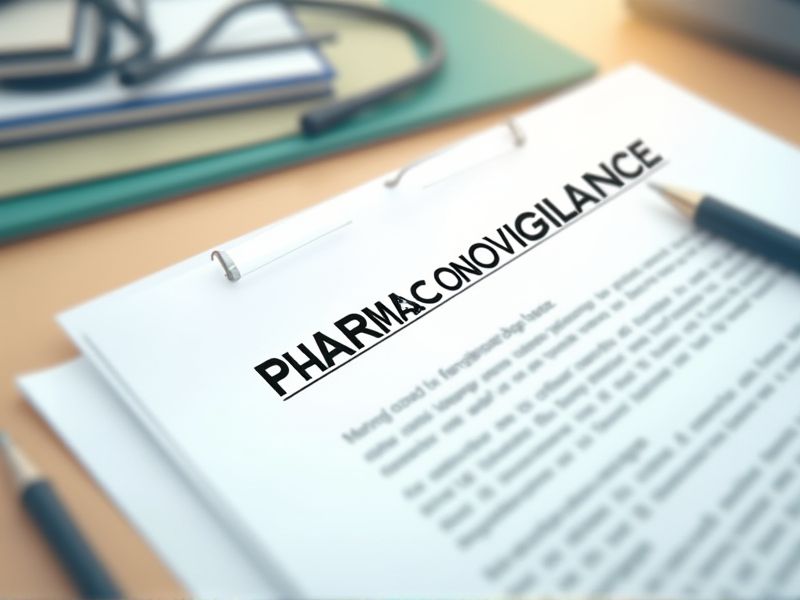
Pharmacovigilance Specialists play a critical role in monitoring drug safety, ensuring that medications deliver therapeutic benefits while minimizing risks. Certifications provide these professionals with advanced knowledge, enhancing their ability to identify, evaluate, and manage drug-related adverse effects. Regulatory guidelines and global safety standards demand a comprehensive understanding, underscoring the importance of formalized training. Consider these key certifications essential for a Pharmacovigilance Specialist.
Regulatory Affairs Certification (RAC)
Regulatory Affairs Certification (RAC) equips a Pharmacovigilance Specialist with an in-depth understanding of global regulations, critical for ensuring drug safety compliance. Acquiring RAC validates expertise in navigating complex regulatory frameworks, directly impacting the efficacy and safety monitoring of pharmaceuticals. Holding RAC enhances credibility and demonstrates commitment to upholding stringent safety standards within the pharmacovigilance field. This certification can lead to improved career prospects, as it signifies a professional's capability in regulatory intelligence and risk management.
Certified Pharmacovigilance Professional (CPP)
Pharmacovigilance involves monitoring the safety of pharmaceuticals, and a Certified Pharmacovigilance Professional (CPP) offers validated expertise in this critical area. The certification ensures a thorough understanding of regulatory guidelines and adverse drug reaction reporting protocols, which is essential for effective surveillance. Specialists with CPP credentials are typically better equipped to implement risk management strategies, reducing potential harm from drug therapy. In a field where safety is paramount, the credibility of a CPP can enhance trust between pharmaceutical companies and healthcare providers.
DIA Pharmacovigilance Certificate Program
The DIA Pharmacovigilance Certificate Program enhances skills by offering specialized knowledge in drug safety and risk management. As regulatory demands increase globally, understanding compliance and regulations becomes crucial for a Pharmacovigilance Specialist. The program provides practical insights into adverse event reporting, ensuring specialists maintain high standards in monitoring drug safety. Completing the program can improve career prospects, as employers often seek candidates with demonstrable expertise in pharmacovigilance.
Drug Safety and Pharmacovigilance Certification
A Drug Safety and Pharmacovigilance Certification equips a pharmacovigilance specialist with crucial knowledge to monitor and evaluate the adverse effects of pharmaceuticals effectively. Certification ensures the specialist adheres to international regulatory standards, enhancing reliability in reporting drug-related issues. The training emphasizes risk management processes, which directly improve patient safety by identifying and mitigating potential drug risks. Certified professionals gain a competitive edge in the job market, reflecting their commitment to maintaining high safety standards in pharmaceutical care.
Good Clinical Practice (GCP) Certification
Good Clinical Practice (GCP) Certification ensures that a Pharmacovigilance Specialist adheres to ethical and scientific standards when conducting clinical trials. This certification provides a framework for proper documentation, ensuring data integrity and reliability in monitoring drug safety. Knowledge of GCP principles helps specialists identify and report adverse drug reactions accurately, enhancing patient safety. Regulatory bodies require GCP compliance, making it essential for professionals to uphold industry standards and meet legal obligations.
ACRP Certified Clinical Research Professional (CCRP)
Obtaining an ACRP Certified Clinical Research Professional (CCRP) credential enhances a pharmacovigilance specialist's ability to ensure drug safety through a thorough understanding of clinical trial processes. The certification denotes a standardized level of expertise and knowledge, promoting trust in the specialist's ability to handle complex drug safety data. This credential supports adherence to global regulatory standards, which are crucial for the effective monitoring of adverse drug reactions. Employers recognize the designation as a commitment to professional development, often leading to improved career prospects and industry recognition for the specialist.
Certified Clinical Data Manager (CCDM)
The complex nature of pharmacovigilance requires a Certified Clinical Data Manager to ensure the integrity and reliability of collected data, as errors could lead to unsafe drug use. Accurate data management under CCDM guidelines supports the identification and analysis of adverse drug reactions, enhancing patient safety. A CCDM provides a structured approach to data handling, which improves the efficiency of reporting and compliance with regulatory standards. Effective data management by a CCDM enables pharmacovigilance specialists to make informed decisions based on comprehensive and accurate datasets.
Master Certificate in Pharmacovigilance and Drug Safety
A Master Certificate in Pharmacovigilance and Drug Safety enhances a specialist's ability to recognize, assess, and manage the risks associated with pharmaceutical products. Comprehensive training in safety regulations and monitoring processes helps in maintaining compliance with international guidelines. Understanding the intricacies of pharmacovigilance improves a professional's capacity to contribute to safer drug development and post-market surveillance. Continuous education in evolving drug safety practices is critical to effectively safeguard public health.
Certified Medical Affairs Specialist (CMAS)
Certified Medical Affairs Specialists (CMAS) provide a nuanced understanding of clinical data, which enhances pharmacovigilance practices by improving the accuracy of safety assessments. Their expertise in regulatory affairs enables the development of more comprehensive and compliant safety protocols for medications. A CMAS's skills in medical communication aid in clear and effective dissemination of drug safety information to healthcare professionals and the public. The specialized training of CMAS ensures that pharmacovigilance teams can more effectively identify and mitigate potential drug-related risks.
Advanced Pharmacovigilance Training Program (APTP)
The need for the Advanced Pharmacovigilance Training Program (APTP) for Pharmacovigilance Specialists arises due to the increasing complexity of drug safety regulations and the growing volume of data requiring analysis. More comprehensive training enhances the ability to detect, assess, and prevent adverse drug reactions, thus ensuring patient safety. With technological advancements in data collection and analytics, specialists equipped through APTP can effectively harness modern tools for more accurate and efficient pharmacovigilance practices. As the boundaries of pharmacology expand globally, culturally diverse perspectives on drug safety necessitate advanced cross-border regulatory knowledge, which APTP addresses.
Summary
Obtaining certifications in pharmacovigilance can enhance your credibility and expertise in the field. You may find increased job opportunities and advancement possibilities due to your validated skills. Employers often value certified specialists, possibly leading to better compensation and job security. Your ability to contribute to drug safety monitoring can improve, leading to potential positive impacts on patient safety.
